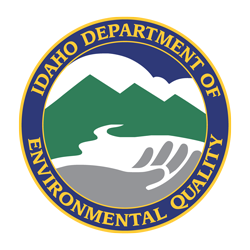Permitting authority for sewage sludge and biosolids will transfer to DEQ from EPA on July 1, 2021.
Sewage sludge is the solid, semisolid, or liquid untreated residue created during the wastewater treatment process. When treated and processed, sludge becomes biosolids, which are the stabilized residuals that settle from the water during the treatment process. Biosolids may be disposed of or beneficially re-used. Because biosolids contain nutrients and organic matter, they are considered a beneficial resource by the US Environmental Protection Agency and DEQ and the reuse of biosolids through land application is encouraged. When land applied, biosolids can be used as fertilizer to help improve and maintain productive soils and stimulate plant growth.
Before biosolids may be land applied, they must be treated to meet standards for pathogens, vectors, and metals. Biosolids treatment is designed to kill pathogens, stabilize organic matter, reduce odors, and minimize vector attraction. Regardless of whether biosolids are disposed of or beneficially reused, they are subject to certain federal, state, and local regulations.
To apply for biosolids coverage, go to DEQ’s E-Permitting system. For assistance, please contact the IPDES E-Permitting Support at (833) 473-3724 or IPDESE-Permitting@deq.idaho.gov
This accordion will not appear on the screen
Discharging POTWs that generate, treat, or dispose of sludge must do so in accordance with their IPDES permits. This includes submitting a 2S form to EPA until DEQ has authority for the biosolids program, meeting pollutant concentrations for the selected disposal method, and submitting an annual report. Additional state requirements from IDAPA 58.01.16 “Wastewater Rules” are also incorporated into IPDES permits.
Non-discharging facilities or persons that generator or prepare biosolids must apply for a general permit (WHEN). This can include surface disposal site owners/operators, biosolids composters, biosolids incinerator owners/operators, and any person changing the quality of biosolids. Each must have coverage for the disposal and use of biosolids. In addition, DEQ may require land appliers, haulers, septage pumpers, and biosolids packagers to apply for coverage under a general permit once DEQ obtains authority for the biosolids program.

